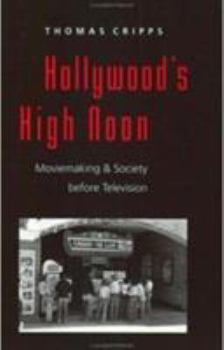Hollywood's High Noon: Moviemaking and Society Before Television
Select Format
Select Condition 
Book Overview
A lively narrative history of Hollywood's classical age. Over the last twenty-five years, the field of cinema studies has offered a dramatic reassessment of the history of film in general and of Hollywood in particular. Writers have drawn on the methodologies of a number of disciplines--literary criticism, sociology, psychology, women's studies, and minority and gay studies--to deepen our understanding of motion pictures, the film...
Format:Paperback
Language:English
ISBN:0801853168
ISBN13:9780801853166
Release Date:November 1996
Publisher:Johns Hopkins University Press
Length:200 Pages
Weight:1.00 lbs.
Dimensions:0.8" x 6.1" x 9.1"
Grade Range:Postsecondary and higher
Customer Reviews
1 rating
A Good Start at Exploring the History of the Film Industy
Published by Thriftbooks.com User , 20 years ago
Moviemaking before the latter 1950s and the rise of the television has been the subject of numerous studies. This book explores the rise of the film industry, concentrating on the experience in Hollywood, and offering an analysis of the changes in the industry wrought by technology (sound pictures, color, cinemascope), business (the studio system, contract players, star power, vertical integration), and culture (the meaning of films, the experience of the viewer). Cripps does an excellent job demonstrating the rise of the Hollywood oligopoly, and the alternatives that arose to that system but could never quite break its control. He expends considerable effort discussing various genres that arose before World War II, especially westerns and gangster films. The high point of Hollywood, at least according to many in the industry, was its effort in World War II to make films that were both entertaining and helpful to the war effort. Cripps discusses this activity from the Anglophillic "Goodbye, Mr. Chips" (1939) through "Casablanca" (1942) to John Ford's semi-documentaries such as "They Were Expendable" (1945), as well as a host of other works. He also spends considerable effort unpacking the relationship of Hollywood to the Office of War Information (OWI) and finds that the Hollywood moguls, who had spent their careers answering to their moneyed overlords in New York, had little trouble answering to OWI communicators in Washington. Cripps concludes the book with a discussion of the collapse of the studio system after World War II. He explains that this took place because of several key issues. First, the suburbanization of America meant that moviegoers abandoned their downtown theaters and the current metroplexes did not emerge until much later. Second, the sudden rise in family development, sparking the advent of the baby boom, meant that these new families sought entertainment that was more private than the public gathering of the theater. Third, television arose and this gave these new families entertainment that they could partake of together in their homes. Finally, government antitrust action broke apart the vertical integration that had dominated in the prewar era.Cripps also discusses the experience of the moviegoer in the theater throughout the first half of the twentieth century. He finds that the shared experience of sitting with others in a darkened theater partaking of exotic adventures, romances, historical and futuristic times, and the like provided a unique experience unavailable anywhere else. This experience profoundly affected how people embraced the movies as a central part of modern culture. Also overlaying the entire book is the issue of film censorship. The industry both self-regulated itself and had overseers who regulated it to create film that reinforced specific cultural and national values while discouraging mindsets and actions that went against the status quo.This is a very interesting book and one that I would recommen






